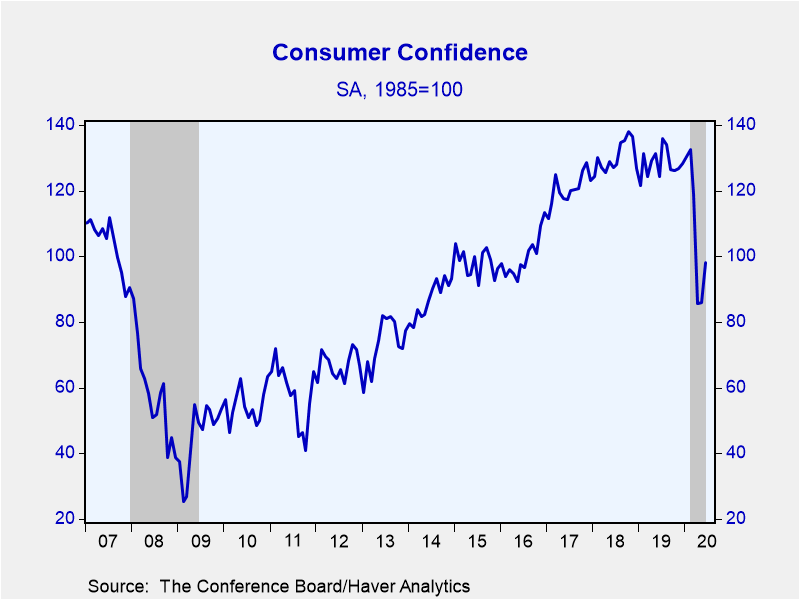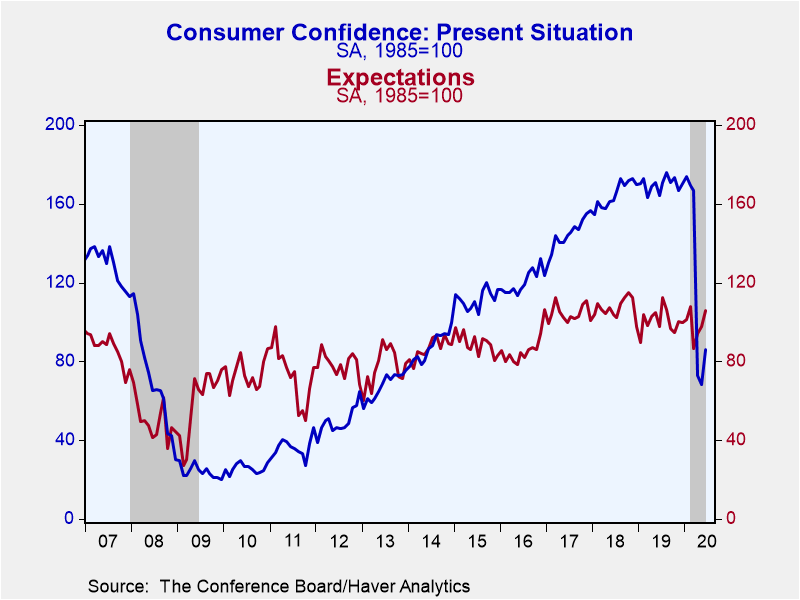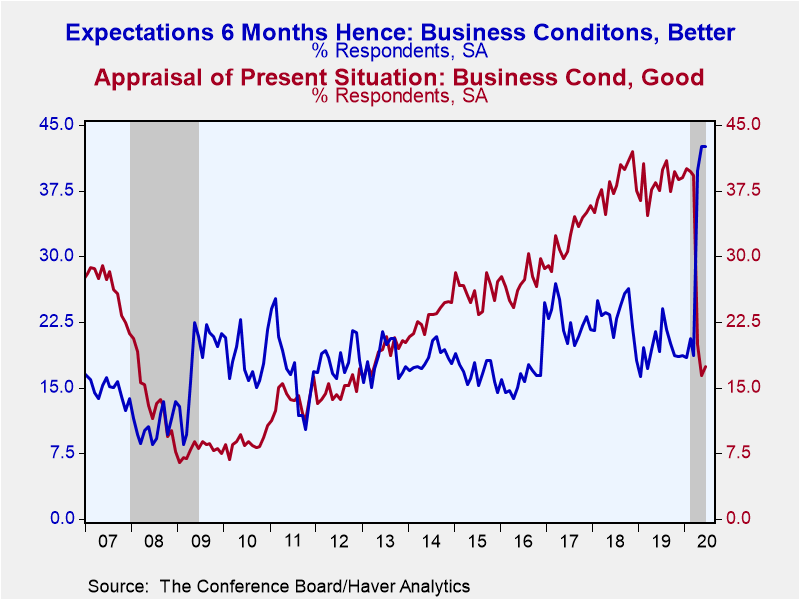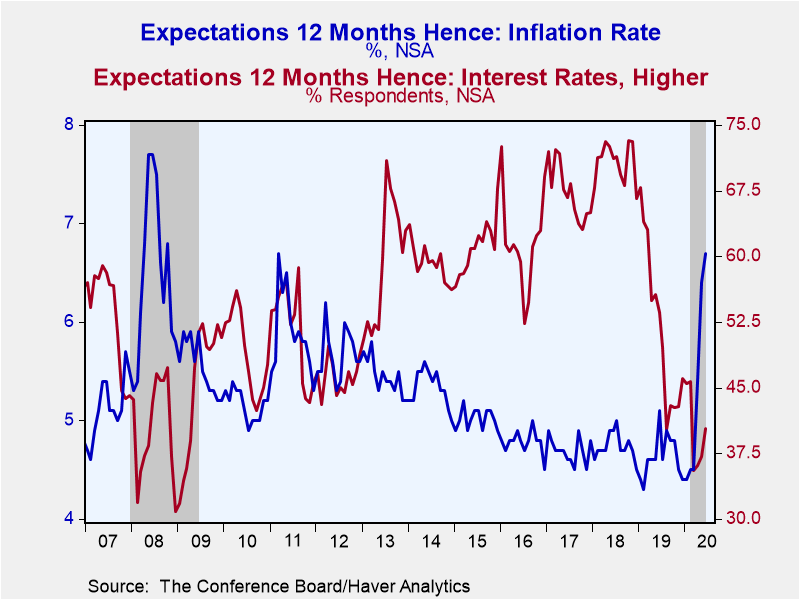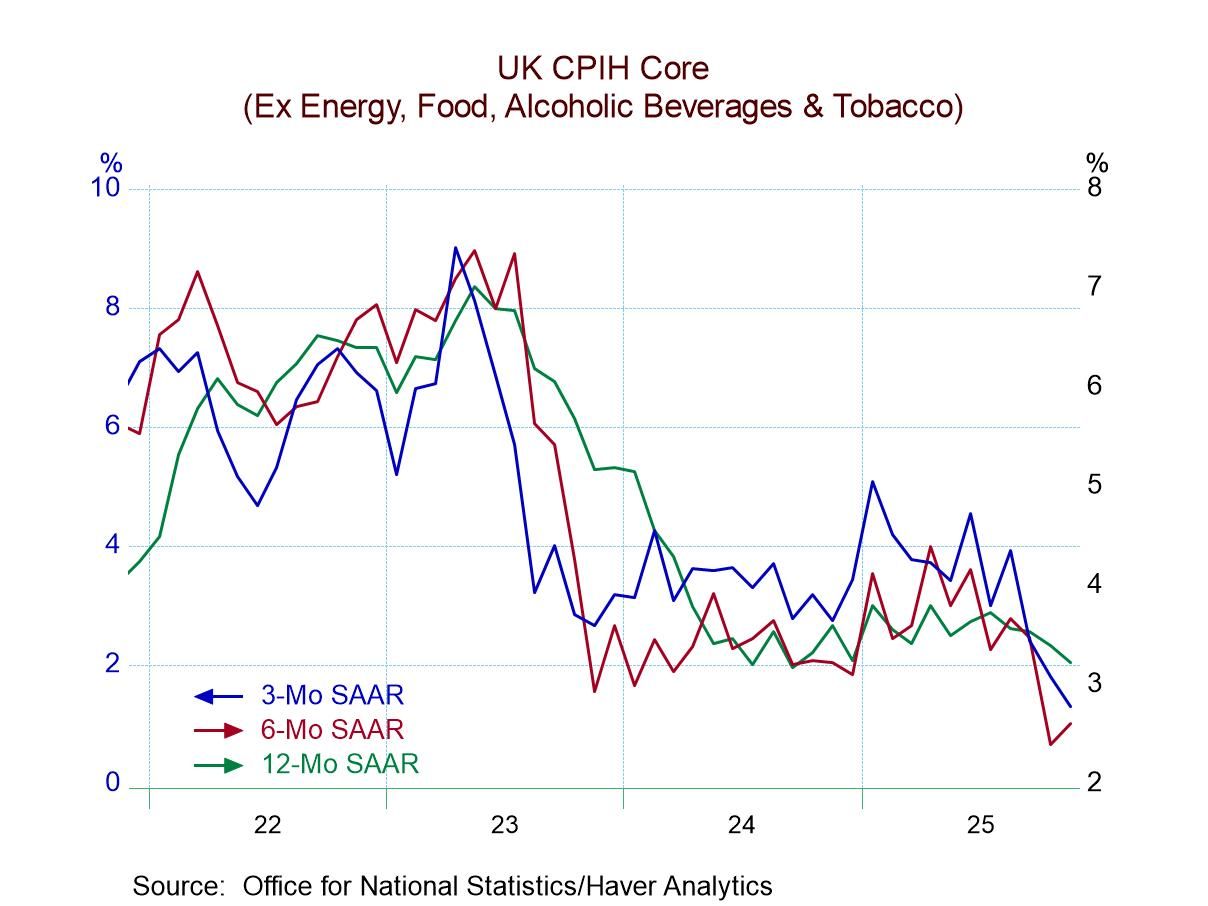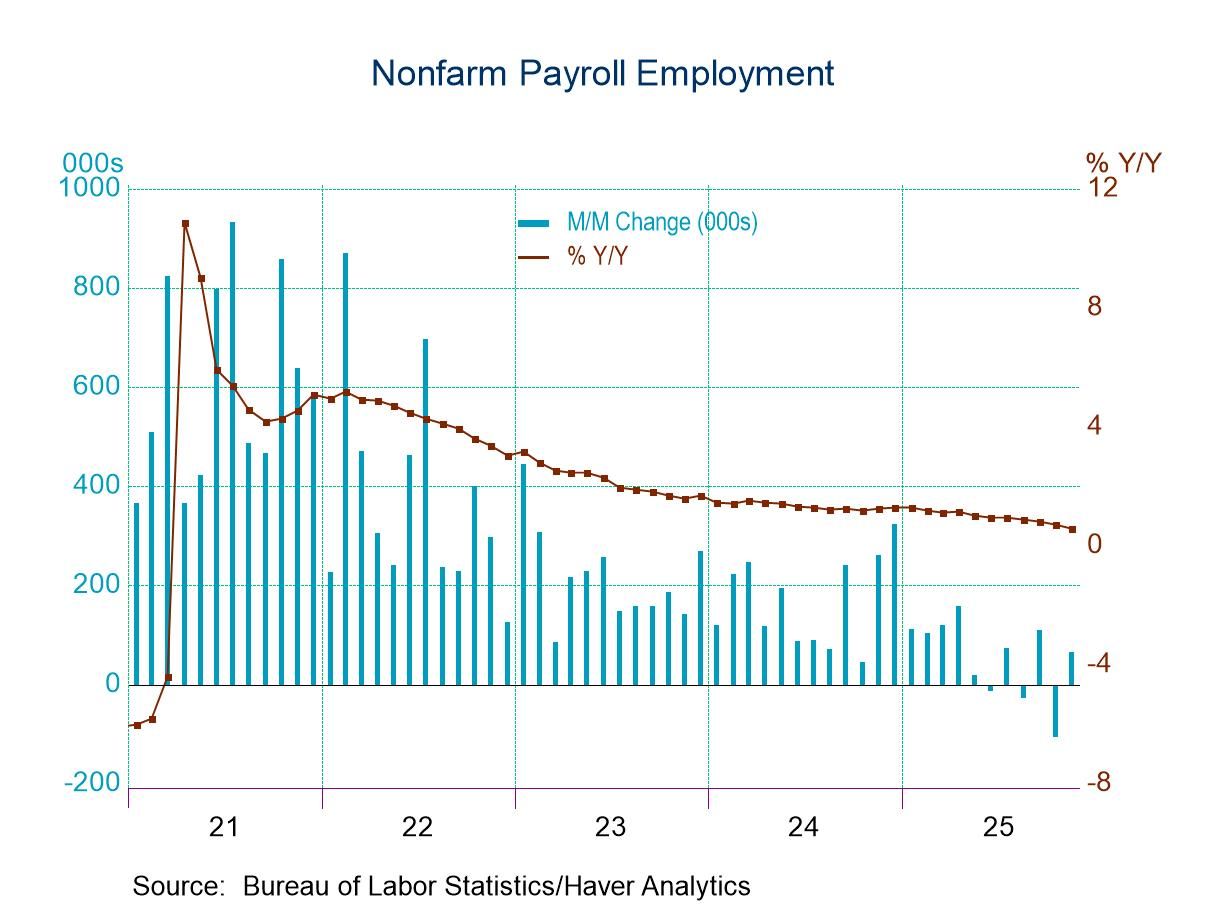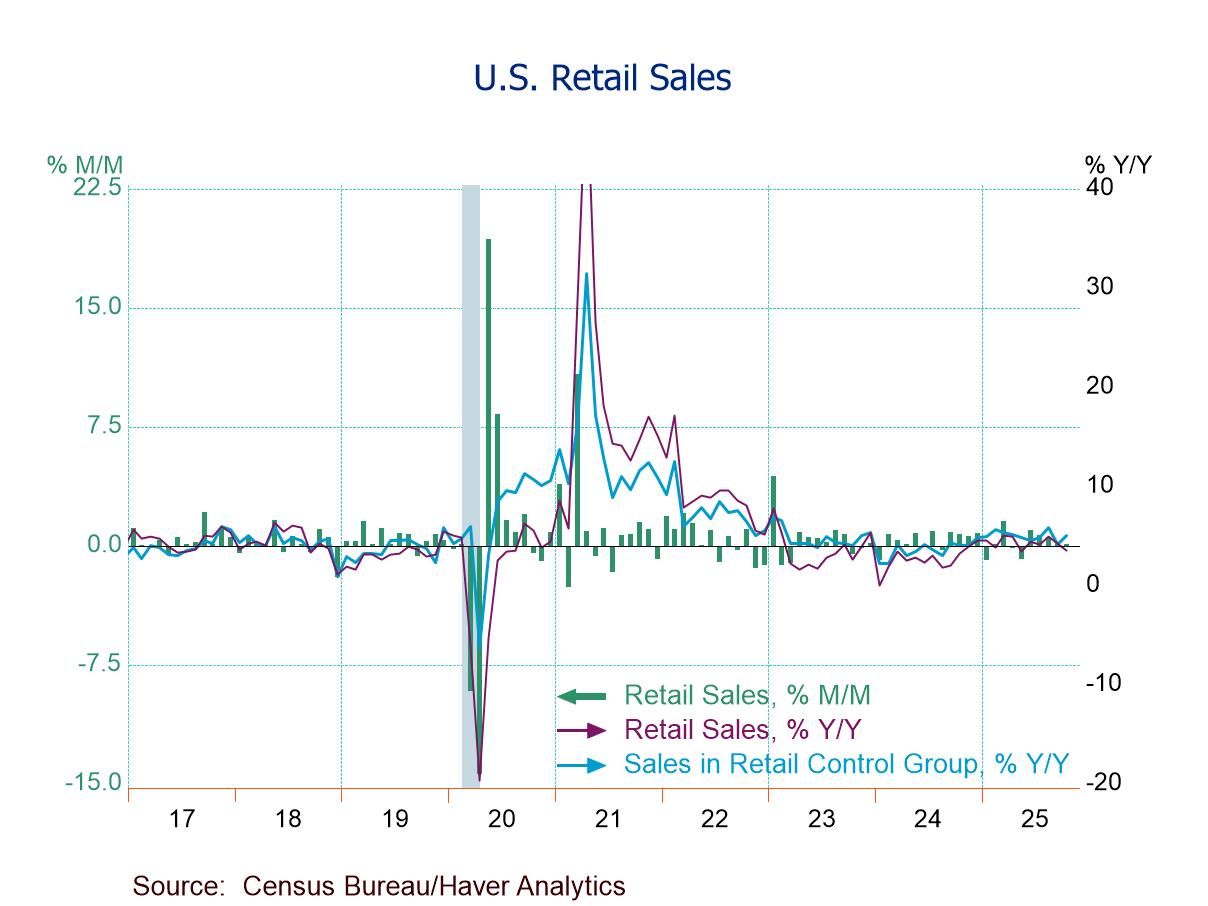 Global| Jun 30 2020
Global| Jun 30 2020U.S. Consumer Confidence Strengthens in June
by:Tom Moeller
|in:Economy in Brief
Summary
• The reading of current conditions increases sharply. • Expectations improve again. • All age groups feel better. Broad improvement in consumer confidence in June reflected re-opening of the economy and fewer claims for unemployment [...]
• The reading of current conditions increases sharply.
• Expectations improve again.
• All age groups feel better.
Broad improvement in consumer confidence in June reflected re-opening of the economy and fewer claims for unemployment insurance, according to the Conference Board. Their Index of Consumer Confidence jumped 14.2% (-21.1% y/y) this month to 98.1 following a 0.2% May increase, revised from 1.1%. Confidence was at its highest level since March. A decline to an index level of 90.0 had been expected in the Action Economics Forecast Survey. Over the last 20 years, there has been a 60% correlation between the level of confidence and the y/y change in real consumer spending.
The index of current conditions surged 26.0% to the highest level since March, but remained nearly one-half below the level twelve months earlier. A slightly higher 17.4% of respondents felt that business conditions were good, but a significantly reduced 43.2% felt that they were bad. Jobs were viewed as plentiful by a higher 20.8% of respondents, half of those who felt so in June 2019. Jobs were viewed as hard to get by a lessened 23.8% of respondents, down from 34.5% in April.
The index of expected business conditions in six months rose 8.6%, following a 3.5% rise in May. An improved 42.6% of respondents felt that would business conditions would improve, up from the low of 18.7% in March. Thirty-eight percent of respondents felt that there would be more jobs in six months, down slightly from April but up from 15.5% in December. These were accompanied by a slight improvement in earnings expectations. A still weak 15.1% of respondents felt that income would improve.
Expectations for the inflation rate in twelve months strengthened to 6.7% and added to May's increase. It was the highest level since March 2011, up from 4.4% this past January. Interest rates were expected to move higher in twelve months by 40.3% of respondents, up from 35.5% in March but still nearly half the 2018 high. An improved 1.7% planned to buy a new home. A steady 4.0% planned to buy a new car within six months while a lessened 45.5% planned to buy a major appliance, down from February's high of 55.0%.
By age group, the index of confidence amongst those under age 35 jumped by roughly one-third (-1.9% y/y) followed by improvement amongst older individuals. For respondents over age 55, confidence improved 14.0% (-20.3% y/y). For those aged 35-54, confidence gained 8.8% (-28.8% y/y).
The Consumer Confidence data are available in Haver's CBDB database. The total indexes appear in USECON, and the market expectations are in AS1REPNA.
Coronavirus and CARES Act by Fed Chair Jerome H. Powell is available here.
| Conference Board (SA, % Chg.) | Jun | May | Apr | Jun Y/Y | 2019 | 2018 | 2017 |
|---|---|---|---|---|---|---|---|
| Consumer Confidence Index | 14.2 | 0.2 | -27.9 | -21.1 | -1.4 | 8.0 | 20.7 |
| Present Situation | 26.0 | -6.3 | -56.2 | -47.5 | 3.1 | 13.8 | 20.3 |
| Expectations | 8.6 | 3.5 | 8.6 | 8.6 | -6.0 | 2.6 | 21.1 |
| Consumer Confidence By Age Group | |||||||
| Under 35 Years | 31.0 | -10.7 | -23.9 | -1.9 | 0.3 | 2.7 | 6.4 |
| Aged 35-54 Years | 8.8 | 3.3 | -28.6 | -28.8 | -1.1 | 7.0 | 16.4 |
| Over 55 Years | 14.0 | 2.5 | -29.2 | -20.3 | -1.9 | 11.8 | 33.5 |
Tom Moeller
AuthorMore in Author Profile »Prior to joining Haver Analytics in 2000, Mr. Moeller worked as the Economist at Chancellor Capital Management from 1985 to 1999. There, he developed comprehensive economic forecasts and interpreted economic data for equity and fixed income portfolio managers. Also at Chancellor, Mr. Moeller worked as an equity analyst and was responsible for researching and rating companies in the economically sensitive automobile and housing industries for investment in Chancellor’s equity portfolio. Prior to joining Chancellor, Mr. Moeller was an Economist at Citibank from 1979 to 1984. He also analyzed pricing behavior in the metals industry for the Council on Wage and Price Stability in Washington, D.C. In 1999, Mr. Moeller received the award for most accurate forecast from the Forecasters' Club of New York. From 1990 to 1992 he was President of the New York Association for Business Economists. Mr. Moeller earned an M.B.A. in Finance from Fordham University, where he graduated in 1987. He holds a Bachelor of Arts in Economics from George Washington University.


